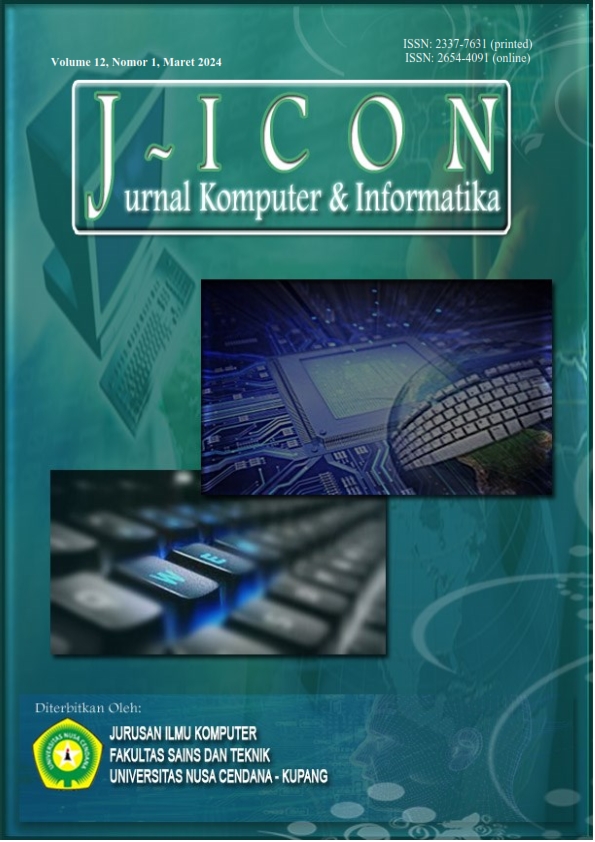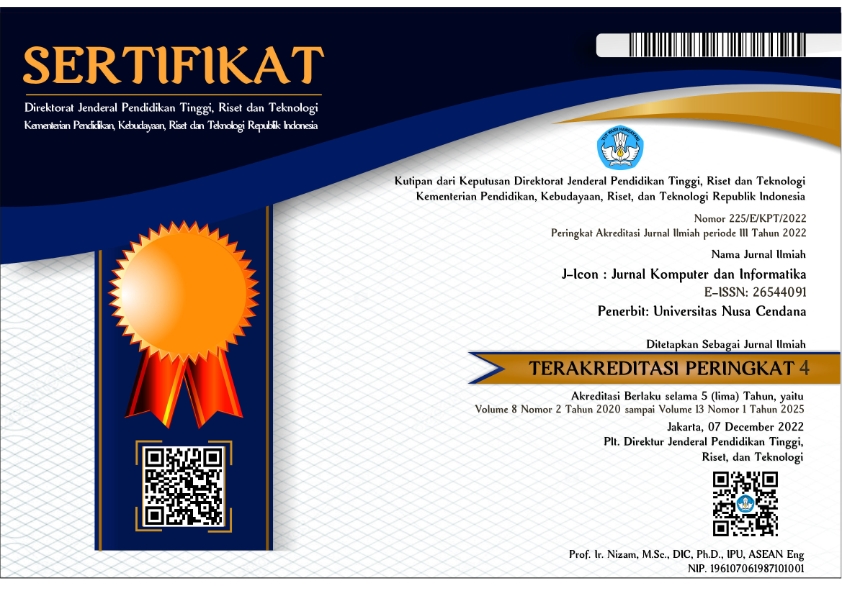SENTIMENT ANALYSIS OF THE USE OF THE MERDEKA MENGAJAR APPLICATION ON THE GOOGLE PLAY STORE
Abstract
To provide a solution to the learning loss that has occurred in the education sector in Indonesia since the COVID-19 pandemic, the Ministry of Education, Culture, Research, and Technology (Kemendikbudristek) released the "Merdeka" curriculum. To assist teachers in obtaining references, inspiration, and understanding of the "Merdeka" curriculum, Kemendikbudristek launched the "Merdeka Mengajar" platform, which can be downloaded from the Google Play Store. However, the utilization of this application has not yet reached the target number of users expected. To determine the achieved number of users, the analysis process stages are carried out, namely data collection, data pre-processing (pre-processing), data labeling (labeling), word extraction, classification, classification evaluation, sentiment analysis using the naïve Bayes model, and Support Vector Machine (SVM). The research results, using n-gram implementation with the naive Bayes and SVM models, show that the accuracy level generated by each model is 86% and 91%, respectively. Sentiment analysis indicates that 3,225 (57%) user reviews are positive, while 2,421 (43%) are negative. Overall, it can be concluded that the sentiment regarding the use of the independent teaching application is positive. Meanwhile, several factors causing users to provide negative reviews include difficulties during activation, incomplete learning modules, and requests to release the application on IOS.
Downloads
References
E. Susilawati, S. Sarifudin, and S. Muslim, “Internalisasi Nilai Pancasila Dalam Pembelajaran Melalui Penerapan Profil Pelajar Pancasila Berbantuan Platform Merdeka Mengajar,” J. Teknodik, vol. 25, pp. 155–167, 2021, doi: 10.32550/teknodik.v25i2.897.
A. Silvi Lisvian Sari, C. Pramesti, and R. R. Suliana, “Sosialisasi Platform Merdeka Mengajar Sebagai Wadah Belajar Dan Berkreasi Guru,” J. Penamas Adi Buana, vol. 6, no. 01, pp. 63–72, 2022. [Online]. Available: http://jurnal.unipasby.ac.id/index.php/penamas.
A. Arnes, M. Muspardi, and Y. Yusmanila, “Analisis Pemanfaatan Platform Merdeka Mengajar Oleh Guru PPKn untuk Akselerasi Implementasi Kurikulum Merdeka,” Edukatif J. Ilmu Pendidik., vol. 5, no. 1, pp. 60–70, 2023, doi: 10.31004/edukatif.v5i1.4647.
D. Marisana, S. Iskandar, and D. T. Kurniawan, “Penggunaan Platform Merdeka Mengajar untuk Meningkatkan Kompetensi Guru di Sekolah Dasar,” J. Basicedu, vol. 7, no. 1, pp. 139–150, 2023, doi: 10.31004/basicedu.v7i1.4363.
D. A. K. Arisanti, “Analisis Kurikulum Merdeka Dan Platform Merdeka Belajar Untuk Mewujudkan Pendidikan Yang Berkualitas,” J. Penjaminan Mutu, vol. 8, no. 02, pp. 243–250, 2022, doi: 10.25078/jpm.v8i02.1386.
A. Ketaren, F. Rahman, H. P. Meliala, N. Tarigan, and R. Simanjuntak, “Monitoring dan Evaluasi Pemanfaatan Platform Merdeka Mengajar pada Satuan Pendidikan Aswinta,” J. Pendidik. dan Konseling, vol. 4, no. 6, pp. 10340–10343, 2022, doi: 10.31004/jpdk.v4i6.10030.
R. I. Alhaqq, I M. K. Putra, and Y. Ruldeviyani, “Analisis Sentimen terhadap Penggunaan Aplikasi MySAPK BKN di Google Play Store,” J. Nas. Tek. Elektro dan Teknol. Inf., vol. 11, no. 2, pp. 105–113, 2022, doi: 10.22146/jnteti.v11i2.3528.
J. Cervantes, F. Garcia-Lamont, L. Rodríguez-Mazahua, and A. Lopez, “A comprehensive survey on support vector machine classification: Applications, challenges and trends,” Neurocomputing, vol. 408, no. xxxx, pp. 189–215, 2020, doi: 10.1016/j.neucom.2019.10.118.
A. N. Muhammad, S. Bukhori, and P. Pandunata, “Sentiment Analysis of Positive and Negative of YouTube Comments Using Naïve Bayes-Support Vector Machine (NBSVM) Classifier,” Proc. - 2019 Int. Conf. Comput. Sci. Inf. Technol. Electr. Eng. ICOMITEE 2019, vol. 1, pp. 199–205, 2019, doi: 10.1109/ICOMITEE.2019.8920923.
A. R. Isnain, A. I. Sakti, D. Alita, and N. S. Marga, “Sentimen Analisis Publik Terhadap Kebijakan Lockdown Pemerintah Jakarta Menggunakan Algoritma Svm,” J. Data Min. dan Sist. Inf., vol. 2, no. 1, p. 31, 2021, doi: 10.33365/jdmsi.v2i1.1021.
I. C. Sari and Y. Ruldeviyani, “Sentiment Analysis of the Covid-19 Virus Infection in Indonesian Public Transportation on Twitter Data: A Case Study of Commuter Line Passengers,” 2020 Int. Work. Big Data Inf. Secur. IWBIS 2020, pp. 23–28, 2020, doi: 10.1109/IWBIS50925.2020.9255531.
E. A. Sukma, A. N. Hidayanto, A. I. Pandesenda, A. N. Yahya, P. Widharto, and U. Rahardja, “Sentiment Analysis of the New Indonesian Government Policy (Omnibus Law) on Social Media Twitter,” Proc. - 2nd Int. Conf. Informatics, Multimedia, Cyber, Inf. Syst. ICIMCIS 2020, no. July 2017, pp. 153–158, 2020, doi: 10.1109/ICIMCIS51567.2020.9354287.
D. Darwis, N. Siskawati, and Z. Abidin, “Penerapan Algoritma Naive Bayes Untuk Analisis Sentimen Review Data Twitter Bmkg Nasional,” J. Tekno Kompak, vol. 15, no. 1, p. 131, 2021, doi: 10.33365/jtk.v15i1.744.
P. P. E. Indarbensyah and N. Rochmawati, “Penerapan N-Gram menggunakan Algoritma Random Forest dan Naïve Bayes Classifier pada Analisis Sentimen Kebijakan PPKM 2021,” J. Informatics Comput. Sci., vol. 2, no. 04, pp. 235–244, 2021, doi: 10.26740/jinacs.v2n04.p235-244.
R. M. Amir Latif, M. Talha Abdullah, S. U. Aslam Shah, M. Farhan, F. Ijaz, and A. Karim, “Data scraping from google play store and visualization of its content for analytics,” 2019 2nd Int. Conf. Comput. Math. Eng. Technol. iCoMET 2019, no. July, 2019, doi: 10.1109/ICOMET.2019.8673523.
D. Effrosynidis, S. Symeonidis, and A. Arampatzis, “A Comparison Of Pre-Processing Techniques For Twitter Sentiment Analysis,” Lect. Notes Comput. Sci. (including Subser. Lect. Notes Artif. Intell. Lect. Notes Bioinformatics), vol. 10450 LNCS, no. September, pp. 394–406, 2017, doi: 10.1007/978-3-319-67008-9_31.
J. Kaur, “Stopwords Removal and Its Algorithms Based on Different Methods,” Int. J. Adv. Res. Comput. Sci., vol. 9, no. 5, pp. 81–88, 2018, doi: 10.26483/ijarcs.v9i5.6301.
F. Z. Tala, “A Study of Stemming Effects on Information Retrieval in Bahasa Indonesia,” M.Sc. Thesis, Append. D, vol. pp, pp. 39–46, 2003. [Online]. Available: https://eprints.illc.uva.nl/ id/eprint/740
A. S. Neogi, K. A. Garg, R. K. Mishra, and Y. K. Dwivedi, “Sentiment Analysis And Classification Of Indian Farmers’ Protest Using Twitter Data,” Int. J. Inf. Manag. Data Insights, vol. 1, no. 2, p. 100019, 2021, doi: 10.1016/j.jjimei.2021.100019.
A. M. Pravina, I. Cholissodin, and P. P. Adikara, “Analisis Sentimen Tentang Opini Maskapai Penerbangan pada Dokumen Twitter Menggunakan Algoritma Support Vector Machine (SVM),” J. Pengemb. Teknol. Inf. dan Ilmu Komput., vol. 3, no. 3, pp. 2789–2797, 2019. [Online]. Available: https://j-ptiik.ub.ac.id/index.php/j-ptiik/article/view/4793.
J. Hao and T. K. Ho, “Machine Learning Made Easy: A Review of Scikit-learn Package in Python Programming Language,” J. Educ. Behav. Stat., vol. 44, no. 3, pp. 348–361, 2019, doi: 10.3102/1076998619832248.
S. Al-Saqqa, G. Al-Naymat, and A. Awajan, “A large-scale sentiment data classification for online reviews under apache spark,” Procedia Comput. Sci., vol. 141, no. November, pp. 183–189, 2018, doi: 10.1016/j.procs.2018.10.166.
M. R. Nadhif, D. Wisnu Brata, and B. Rahayudi, “Analisis Sentimen Data Ulasan Pengguna Aplikasi TIX ID di Indonesia pada Google Play Store menggunakan Support Vector Machine,” J. Pengemb. Teknol. Inf. dan Ilmu Komput., vol. 6, no. 8, pp. 3932–3937, 2022. [Online]. Available: https://j-ptiik.ub.ac.id/index.php/j-ptiik/article/view/11477.
I. Markoulidakis, I. Rallis, I. Georgoulas, G. Kopsiaftis, A. Doulamis, and N. Doulamis, “Multiclass Confusion Matrix Reduction Method and Its Application on Net Promoter Score Classification Problem,” Technologies, vol. 9, no. 4, 2021, doi: 10.3390/technologies9040081.
S. Rajalakshmi, S. Asha, and N. Pazhaniraja, “A comprehensive survey on sentiment analysis,” 2017 4th Int. Conf. Signal Process. Commun. Networking, ICSCN 2017, no. June, 2017, doi: 10.1109/ICSCN.2017.8085673.
A. Polyvyanyy, A. Solti, M. Weidlich, C. Di Ciccio, and J. Mendling, “Monotone Precision and Recall Measures for Comparing Executions and Specifications of Dynamic Systems,” ACM Trans. Softw. Eng. Methodol., vol. 29, no. 3, Jun. 2020, doi: 10.1145/3387909.
Copyright (c) 2024 Muhammad Farhan, Muhammad Davin Ramayuda, Yova Ruldeviyani

This work is licensed under a Creative Commons Attribution 4.0 International License.
The author submitting the manuscript must understand and agree that if accepted for publication, authors retain copyright and grant the journal right of first publication with the work simultaneously licensed under a Creative Commons Attribution (CC-BY) 4.0 License that allows others to share the work with an acknowledgment of the work’s authorship and initial publication in this journal.
 Muhammad Farhan(1*)
Muhammad Farhan(1*)




